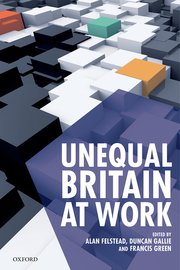Book Review: Unequal Britain at Work edited by Alan Felstead, Duncan Gallie and Francis Green
In Unequal Britain at Work, Alan Felstead, Duncan Gallie and Francis Green examine inequalities in job quality in Britain. The authors look beyond income to explore wider changes to working lives, drawing on data procured through six national Skills and Employment Surveys that asked individuals about their jobs between 1986 and 2012. Dan McArthur welcomes this book for its detailed and nuanced empirical analysis of recent transformations in the UK labour market.

Birmingham New Street Work Force Credit: Gordon Griffiths CC BY-SA 2.0
Unequal Britain at Work. Alan Felstead, Duncan Gallie and Francis Green (eds). Oxford University Press. 2015.
 Often academic and popular discussions think about jobs only in terms of the pay they offer. This is especially the case when talking about inequality. Scholars have highlighted a link between high-wage jobs in finance and technology and the rapid rise in income inequality that has taken place in many countries since the 1980s. Similarly, debates surrounding gender often focus on the ‘pay gap’ between men and women, without looking at other ways in which their working lives might differ. This edited volume provides a welcome counterpoint to these trends, offering a nuanced analysis of the inequalities that emerge when we look at other features of work, such as working hours, the opportunity to use one’s skills and having a say over how one’s job is organised. These issues are important because working under stressful, pressured or insecure conditions can have serious implications for workers’ long-term health and wellbeing.
Often academic and popular discussions think about jobs only in terms of the pay they offer. This is especially the case when talking about inequality. Scholars have highlighted a link between high-wage jobs in finance and technology and the rapid rise in income inequality that has taken place in many countries since the 1980s. Similarly, debates surrounding gender often focus on the ‘pay gap’ between men and women, without looking at other ways in which their working lives might differ. This edited volume provides a welcome counterpoint to these trends, offering a nuanced analysis of the inequalities that emerge when we look at other features of work, such as working hours, the opportunity to use one’s skills and having a say over how one’s job is organised. These issues are important because working under stressful, pressured or insecure conditions can have serious implications for workers’ long-term health and wellbeing.
The editors and contributors to Unequal Britain at Work are a group of academics specialising in the sociology of work, labour economics, industrial relations and social policy from a largely British standpoint. The book focuses on detailed empirical analysis of inequalities in job quality in Britain. Each chapter presents a variety of complex trends: for example, the effects of unionisation or self-employment on the quality of working life. Methodologically the book is heavily quantitative, and some knowledge of regression modelling is probably essential to get the most from it.
The book is held together by the use of a common set of data: the Skills and Employment Survey Series. This comprises six nationally representative surveys conducted between 1986 and 2012 that asked individuals about their jobs. The surveys allow researchers to investigate whether individuals are doing work that gives them autonomy and control over their lives. They go beyond working hours as a measure to ask whether individuals need to meet tight deadlines, work at high speed or under a lot of time pressures. This rich set of data is a strength of the book, covering a period of dramatic change in Britain’s economy and society that saw de-industrialisation and the decline of trade unions on the one hand, and the increasing participation of women and the passing of national minimum wage laws on the other.
The chapters of the book first look at social class and gender differences in job quality before moving onto specific types of employment: namely, part-time, temporary, union vs non-union and public vs private sector. Each chapter is largely self-contained, which makes the book a useful resource for those seeking to get to grips with inequalities in job quality for a specific group. However, the book as a whole can feel repetitive, and the editors do not make sufficient effort to integrate the findings of each chapter into a coherent narrative about inequalities in job quality and how they have changed over time.
In the opening chapter Alan Felstead, Duncan Gallie and Francis Green make the case that the relationship between pay and job quality is complex. They argue against two fairly simple stories: firstly, that higher paying jobs are generally better jobs in all respects; and secondly, that poor working conditions are generally compensated for by good pay. Neither of these is quite true: high-paying jobs tend to offer more chances to use one’s skills and opportunities to choose how one organises work tasks. However, high-paying jobs tend to have greater work intensity and around the same levels of self-reported job insecurity as lower-paid jobs. Thus, pay cannot be relied on as a good proxy for the intrinsic quality of jobs; we need to look at more specific measures of quality.
The issue of gender inequalities is a theme running through several chapters. Joanne Lindley makes the interesting point that while the gender pay gap has fallen as women have increased their skill levels, other non-wage-based inequalities have persisted. For example, women are more likely to report having to work very hard and at high speed, and this gender gap did not narrow significantly between 1997 and 2012. In another chapter, Tracey Warren and Clare Lyonette point out the increase in the number of women doing high-skilled professional jobs on a part-time basis.
One debate which recurs across chapters concerns the idea of the polarisation of the British labour market. It is clear that wages have polarised by social class, as the wages of higher managers and professionals have pulled away from other groups. However, Gallie reports a very different picture for some non-wage aspects of work. He argues that there has been a process of ‘downward convergence’, driven by decreasing job security and levels of influence over work decisions among managerial and professional classes.
A few chapters are very relevant to policy debate. For example, David Blackaby and colleagues challenge the common media narrative that public sector employees are both better paid than their counterparts in the private sector and have more comfortable working conditions. On the contrary, they find that the pay premium in the public sector can be entirely explained by the higher qualification and skill requirements of public sector jobs, and the worse working conditions, which are found to be more stressful and less autonomous. Their evidence is especially relevant given recent protests by junior doctors in the UK about changes to working hours. The editors conclude with a chapter on how job quality might be improved. Their suggestions are focused on legislative changes that appear relatively easy to implement, such as making it easier for employees to set up work councils and making compulsory the enforcement of at-present voluntary health and safety standards.
Unequal Britain at Work is therefore useful for readers who are interested in detailed and nuanced empirical analysis of how inequalities in job quality in Britain have evolved over time, rather than those seeking broad and easily digestible perspectives.
—
This post originally appeared on the LSE Review of Books. It represents the views of the author and not those of Democratic Audit UK or the LSE. Please read our comments policy before posting.
—
Dan McArthur is a PhD student in the LSE Department of Sociology and the LSE International Inequalities Institute. His research investigates the relationship between economic inequality and the stigmatisation of people in poverty in public opinion. Dan holds an MSc in Sociology from LSE, and a BA in Philosophy, Politics and Economics from the University of Oxford. His broader academic interests include the study of social class, comparative political economy, the philosophy of social science and sociological debates about immigration and multiculturalism.





 Democratic Audit's core funding is provided by the Joseph Rowntree Charitable Trust. Additional funding is provided by the London School of Economics.
Democratic Audit's core funding is provided by the Joseph Rowntree Charitable Trust. Additional funding is provided by the London School of Economics.
Book Review: Unequal Britain at Work edited by Alan Felstead, Duncan Gallie and Francis Green https://t.co/6Qvs9uWqxy
Book Review: Unequal Britain at Work edited by Alan Felstead, Duncan Gallie and Francis Green https://t.co/vLgzT2ocPM
RT @EdwardHarkins: Book Review [good]: Unequal Britain at Work: Alan Felstead, D Gallie, F Green https://t.co/BidMKjPueE #labour #inequality
Book Review [good]: Unequal Britain at Work edited by Alan Felstead, D Gallie & F Green https://t.co/ipDfZhhp0w #labour #inequality #work
Book Review: Unequal Britain at Work edited by Alan Felstead, Duncan Gallie and Francis Green https://t.co/fZZJDmPMgc
Book Review: Unequal Britain at Work edited by Alan Felstead, Duncan Gallie and… https://t.co/jKkvOnLmGE https://t.co/zXJ4Czsnvb